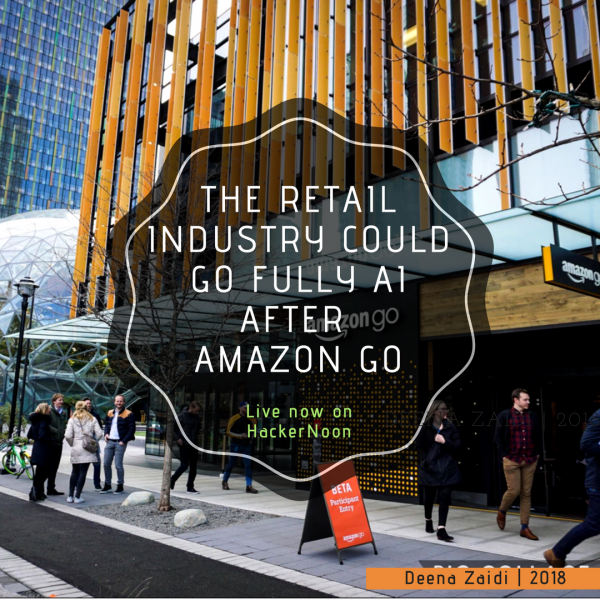In the heart of downtown Seattle lies Amazon Go — a store concept that grabbed headlines after its beta phase opened to the public this year. Its concept could mean that the retail industry could slowly be powered by AI.
But the idea already faces competition as tech startups emerge to introduce similar technologies to autonomous retail stores.
For starters, Amazon Go ‘Just Walk Out’ technology allows users to scan and go, making them dodge lengthy wait lines, dismissing any interactions with human cashiers (because there are none). Through the Amazon Go app, users scan QR codes as hundreds of regular and infrared cameras, camouflaged with the color of the ceiling, help understand which items are taken. The AI-driven store combines computer vision algorithms and machine learning to figure out what and when the user is picking and putting back an item. The credit card connected to the Amazon account is immediately charged during checkout. As the retail behemoth expands its stores in Chicago and San Francisco, everything about the novel concept looks futuristic.
According to Grand View Research (2017), retailers are expected to invest more than $20B per year in the digitalizing the retail sector. Kroger invested in a cashier less checkout service under the name “Scan, Bag, Go” to bring the technology to 400 stores this year. Through a wireless handheld scanner or the installed app on personal devices, customers can scan and bag products as they shop for a quicker, seamless checkout experience.
Computer vision startup AiFi promises a customized, automated environment to traditional stores. The concept is as flexible with a tiny shop as it is with a huge retailer, providing different options ranging from single-cam to multi-cam systems. Real-time tracker and computer vision provide useful insights on consumer behavior.
 Powered by AI, deep learning, computer vision and sensor fusion, the Redmond-based AVA SmoothShop provides pick’n’go solution to brick and mortar stores. It became one of the first companies to deploy cashierless checkout externally in September 2017 after it collaborated with Mastercard. Through its partnerships with Mastercard and Microsoft Azure IoT, AVA is integrating its cashier-less checkout capabilities with innovative fintech solutions to provide comprehensive solutions for retailers across multiple categories. Further, AVA SmoothShop Analytics provides useful insights through key performing indicators (KPIs) like staff effectiveness, shopper’s product preferences, and traffic analysis. So far the company has logged more than 30M customer journeys, 750M interactions with specific products on shelves, and over 20M checkouts in four continents.
Powered by AI, deep learning, computer vision and sensor fusion, the Redmond-based AVA SmoothShop provides pick’n’go solution to brick and mortar stores. It became one of the first companies to deploy cashierless checkout externally in September 2017 after it collaborated with Mastercard. Through its partnerships with Mastercard and Microsoft Azure IoT, AVA is integrating its cashier-less checkout capabilities with innovative fintech solutions to provide comprehensive solutions for retailers across multiple categories. Further, AVA SmoothShop Analytics provides useful insights through key performing indicators (KPIs) like staff effectiveness, shopper’s product preferences, and traffic analysis. So far the company has logged more than 30M customer journeys, 750M interactions with specific products on shelves, and over 20M checkouts in four continents.San Francisco-based Aipoly brings technology to all autonomous markets worldwide. For retailers, this means real-time tracking items on shelves every 50 milliseconds. The technology involved in the mechanism involves valuable suggestions like ideal layouts, fast A/B testing, heat maps etc. The app further directs the customers to the exact shelf of their desired product is placed, also enabling them to request their favorite products in their local store.
The AI-retail concept seemed to be picking up in China. According to iResearch, China’s unmanned retail sector could reach 65 billion yuan ( roughly USD 10.2 billion) in transaction volume by 2020, up from an estimated 20 billion yuan in 2017.
Tencent Holding Ltd rolled out its first cashier-less pop-up store in Shanghai to tap into the country’s promising unmanned retail industry. The shop requires shoppers to scan QR code on WeChat as they enter and exit. China’s retail giant, Alibaba offers a facial recognition station through Futuremart, located at its Hangzhou headquarters. The company sells Alibaba products and boasts of facial recognition technologies. The ‘Happy Go’ meter measures how happy a customer is and provides discounts for those who flash a brilliant smile.
The second biggest online retailer in China after Alibaba, JD.com already operates in more than 10 Chinese cities and intends on opening similar concept across hundreds of locations in China.
 With a total funding of $94.7M, Amazon Go’s Chinese counterpart, BingoBox stores are termed to bring “unattended retail revolution”. With over 200 of self-service specialty stores operational 29 Chinese provinces, BingoBox has items embedded with a radio-frequency identification (RFID) tag. The users scan their items using a standard self-checkout machine, paying through WeChat.
With a total funding of $94.7M, Amazon Go’s Chinese counterpart, BingoBox stores are termed to bring “unattended retail revolution”. With over 200 of self-service specialty stores operational 29 Chinese provinces, BingoBox has items embedded with a radio-frequency identification (RFID) tag. The users scan their items using a standard self-checkout machine, paying through WeChat.
But not all are adamant on the ‘automated’ idea.
Last year, Recode reported that Walmart was gearing to introduce a similar concept for its customers. But the idea of scan and go test soon ended as Walmart chose to kill the app that allowed customers to use smartphones due to ‘low participation’.
As established names and aggressive tech startups automate our retail experience, it remains difficult to scale the potential threat for Amazon Go. Until then it is safe to say, that the retail sector is aggressively gearing up for a huge overhaul that is backed by solid artificial intelligence.
More on Digital Disruption
Follow on the author on LinkedIn — Twitter — Instagram
Photo by Clem Onojeghuo on Unsplash
